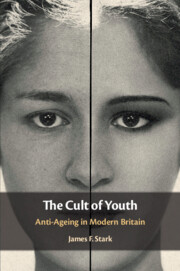1 - Introduction
Published online by Cambridge University Press: 28 February 2020
Summary
This chapter introduces the concept of rejuvenation as both a literal reversing of the ageing process and an attempt to appear younger. It demarcates rejuvenation from longevity – the former pertaining to a state of youth, the latter simply to extended lifespan – and identifies the relevant themes in the secondary literature of historical and sociological research. The search for rejuvenation – whether the mythical elixir of life to achieve eternal youth or everyday creams designed to keep the features looking young – was not an exclusively twentieth-century phenomenon, yet a combination of social, medical, cultural and economic factors resulted in an explosion of interest in anti-ageing in the period immediately following World War One. The first global conflict gave new impetus to efforts promoting strength and vitality in men, and fertility and attractiveness in women. Keeping the population healthy and economically productive was an essential feature of post–World War One western society.
- Type
- Chapter
- Information
- The Cult of YouthAnti-Ageing in Modern Britain, pp. 1 - 23Publisher: Cambridge University PressPrint publication year: 2020

